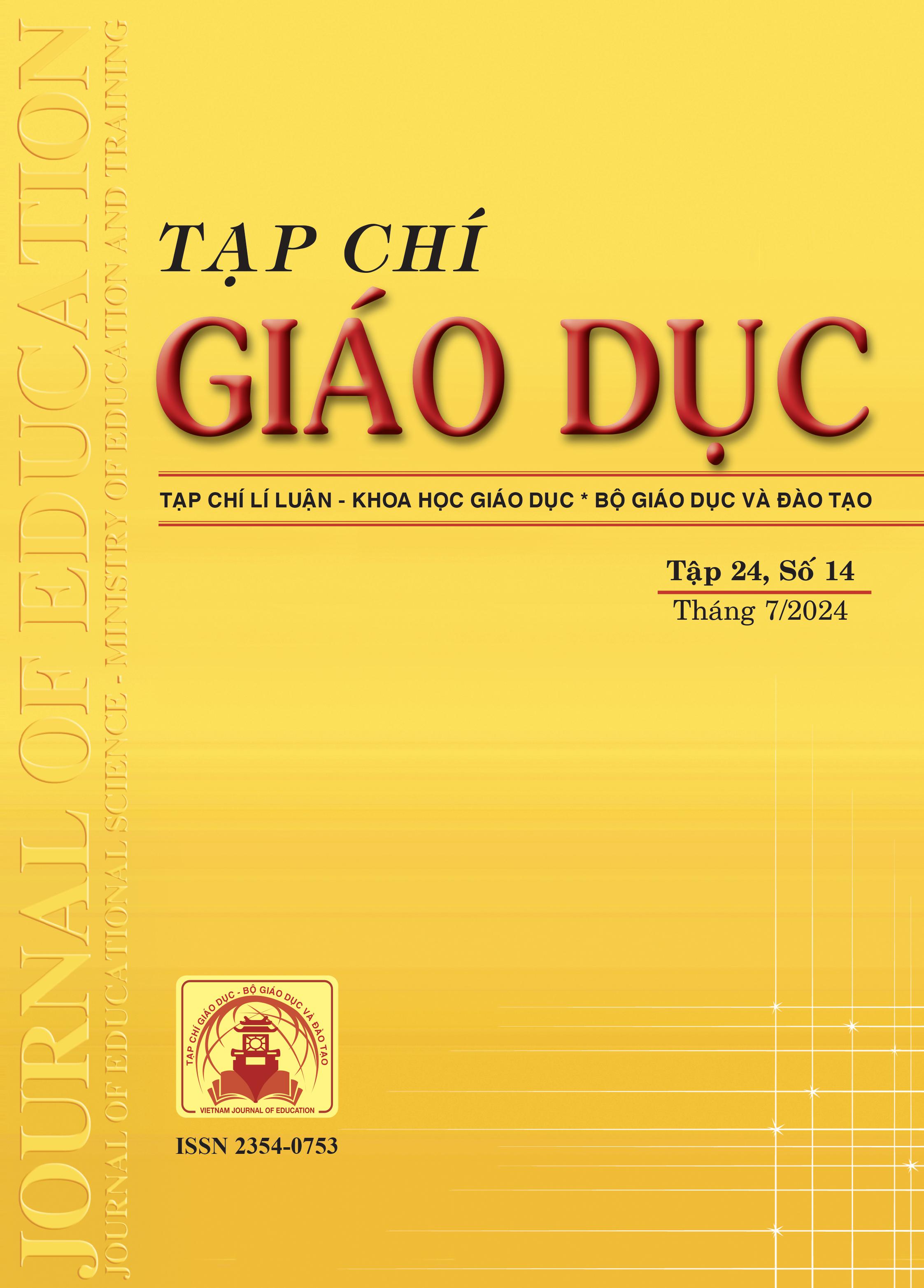Ứng dụng công nghệ thực tế tăng cường (AR) trong dạy học môn Toán cấp tiểu học: Phân tích hiệu quả dựa trên một số nghiên cứu trên thế giới
Tóm tắt
As mathematics has been more widely applied in life, the basic knowledge and skills of mathematics have helped people solve real life problems in a systematic and accurate way, contributing to the development of society. The application of technology in teaching mathematics supports teachers to innovate methods and forms of organizing teaching, and helps students increase their interest, awareness and motivation to learn mathematics. By bringing virtual objects into the real world environment, augmented reality (AR) technology provides a rich and multi-sensory learning experience, while creating a learning environment that promotes active participation and practical experience of students. The article analyzes the effectiveness (impact) of applying AR technology in teaching mathematics at primary school level based on scientific research works that have been published in many prestigious journals in the world, thereby proposing some lessons for Vietnam.
Tài liệu tham khảo
Benassi, A., Carboni, A., Colantonio, S., Coscetti, S., Germanese, D., Jalil, B., Magnavacca, J., Magrini, M., Martinelli, M., Matarese, F., Moroni, D., Paradisi, P., Pardini, F., Pascali, M. A., Pieri, G., Reggiannini, M., Righi, M., Salvetti, O., & Tampucci, M. (2020). Augmented reality and intelligent systems in Industry 4.0. Zenodo.
Bộ GD-ĐT (2018). Chương trình giáo dục phổ thông môn Toán (ban hành kèm theo Thông tư số 32/2018/TT- BGDĐT ngày 26/12/2018 của Bộ trưởng Bộ GD-ĐT).
Bujak, K. R., Radu, I., Catrambone, R., Macintyre, B., Zheng, R., & Golubski, G. (2013). A psychological perspective on augmented reality in the mathematics classroom. Computers & Education, 68, 536-544. https://doi.org/10.1016/j.compedu.2013.02.017
Carmigniani, J., Furht, B., Anisetti, M., Ceravolo, P., Damiani, E., & Ivkovic, M. (2010). Augmented reality technologies, systems and applications. Multimedia Tools and Applications, 51(1), 341-377. https://doi.org/10.1007/s11042-010-0660-6
Carr, J. M. (2012). Does math achievement “h'APP'en” when iPads and game-based learning are incorporated into fifth-grade mathematics instruction?. Journal of Information Technology Education: Research, 11(1), 269-286.
Caudell, T. P., & Mizell, D. W. (1992). Augmented reality: An application of heads-up display technology to manual manufacturing processes. Proceedings of the Twenty-Fifth Hawaii International Conference on System Sciences. (pp. 659-669). https://doi.org/10.1109/HICSS.1992.183317
Chang, Y. S., Hu, K. J., Chiang, C. W., & Lugmayr, A. (2020). Applying Mobile Augmented Reality (AR) to Teach Interior Design Students in Layout Plans: Evaluation of Learning Effectiveness Based on the ARCS Model of Learning Motivation Theory. Sensors, 20(1), 105. https://doi.org/10.3390/s20010105
Chu Viết Tấn (2020). Dạy học theo định hướng STEM bằng “Công nghệ thực tế ảo tăng cường” trong Toán học nhằm phát triển năng lực cho học sinh trung học phổ thông đáp ứng chương trình giáo dục phổ thông mới. https://skkn.vn/skkn-day-hoc-theo-dinh-huong-stem-bang-cong-nghe-thuc-te-ao-tang-cuong-trong-toan-hoc-nham-phat-trien-nang-luc-cho-hs-2259
Felder, R. M., & Brent, R. (2005). Understanding Student Differences. Journal of Engineering Education, 94(1), 57-72. https://doi.org/10.1002/j.2168-9830.2005.tb00829.x
Gargrish, S., Mantri, A., & Kaur, D. P. (2020). Augmented Reality-Based Learning Environment to Enhance Teaching-Learning Experience in Geometry Education. Procedia Computer Science, 172, 1039-1046. https://doi.org/10.1016/j.procs.2020.05.152
Gecu-Parmaksiz, Z., & Delialioğlu, Ö. (2020). The effect of augmented reality activities on improving preschool children’s spatial skills. Interactive Learning Environments, 28(7), 876-889. https://doi.org/10.1080/10494820.2018.1546747
Hoffman, B., & Nadelson, L. (2010). Motivational engagement and video gaming: A mixed methods study. Educational Technology Research and Development, 58(3), 245-270.
Hoffman, D. L., Paek, S., Zhou, Z., & Türkay, S. (2021). Motivation outcomes in math-related video games. Technology, Knowledge and Learning, 26, 637-659. https://doi.org/10.1007/s10758-020-09450-w
Kebritchi, M., Hirumi, A., & Bai, H. (2010). The effects of modern mathematics computer games on mathematics achievement and class motivation. Computers & Education, 55(2), 427-443. https://doi.org/10.1016/j.compedu.2010.02.007
Khan, A., Ahmad, F. H., & Malik, M. M. (2017). Use of digital game-based learning and gamification in secondary school science: The effect on student engagement, learning, and gender difference. Education and Information Technologies, 22, 2767-2804. https://doi.org/10.1007/s10639-017-9622-1
Kwon, H. E., So, H., Han, S. P., & Oh, W. (2016). Excessive dependence on mobile social apps: A rational addiction perspective. Information Systems Research, 27(4), 919-939.
Lê Anh Vinh, Đỗ Đức Lân, Bùi Thị Diển, Vương Quốc Anh, Đặng Thị Thu Huệ, Phùng Thị Thu Trang, Vũ Văn Luân (2022). Báo cáo tổng kết dự án “Xây dựng hệ thống bài học toán tương tác ứng dụng trò chơi và thực tế tăng cường theo chương trình giáo dục phổ thông mới (2018) ở Việt Nam”. Viện Khoa học Giáo dục Việt Nam. OECD (2019). PISA 2018 Assessment and Analytical Framework. PISA, OECD Publishing. https://doi.org/10.1787/b25efab8-en
Vũ Trọng Rỹ (2018). Tiêu chí đánh giá chất lượng và hiệu quả sử dụng thiết bị dạy học ở trường phổ thông. Tạp chí Khoa học Giáo dục Việt Nam, 01, 21-24.
Tải xuống
Đã Xuất bản
Cách trích dẫn
Số
Chuyên mục
Giấy phép

Tác phẩm này được cấp phép theo Ghi nhận tác giả của Creative Commons Giấy phép quốc tế 4.0 .












